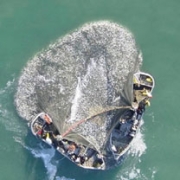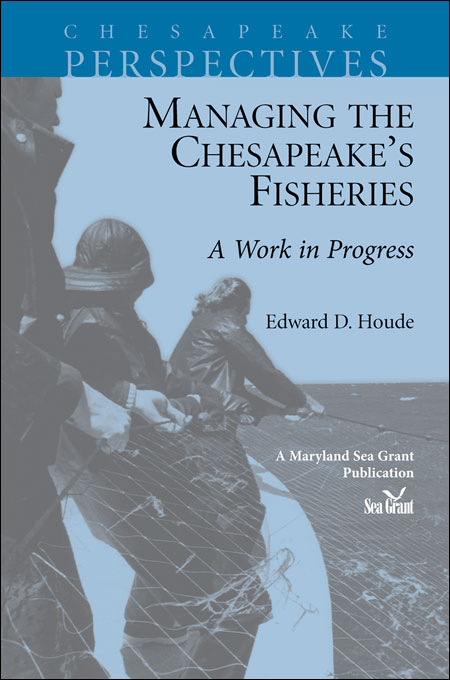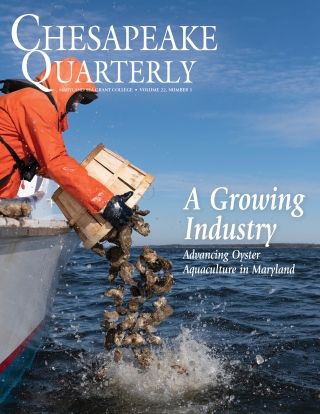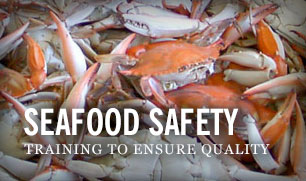Knauss legislative fellowships in Congress help build careers — and they're fun and educational. See our video and fact sheet for details.
After Historic Vote, Menhaden to Get Stronger Protections

Last week was a big week for fish buffs, marine conservation advocates, and the 300 or so employees of Omega Protein, a fish oil manufacturer in in Reedville, Virginia. And maybe a bigger week for a small fish called the Atlantic menhaden.
On December 14, a coalition of federal agencies and 15 states voted to extend new protections to the petite, but important, menhaden. Conservation advocates say the new rules -- which will cap how many menhaden can be caught each year -- take a big step toward recognizing the critical role that the fish plays in marine ecosystems.
It’s a critical role but one that often goes unheralded. People, after all, don’t eat menhaden, which can be found in U.S. waters from Maine south to Florida and in the Chesapeake Bay. The fish are too bony and greasy. But people do catch them -- a lot of them. That’s largely because the menhaden’s high fat content makes the fish a good source for omega-3 fatty acids, the same fish oils that wind up in animal feed and in human nutritional supplements. And the bulk of menhaden caught along the mid-Atlantic coast are caught by Omega Protein’s fleet of ships, although some smaller operations still harvest these fish for the bait trade. For more information on the science and ecological role of menhaden, check out the October 2011 issue of Chesapeake Quarterly, Maryland Sea Grant’s magazine.
Concerns over the health of this fishery have grown during the previous decade as it became clear that menhaden numbers had fallen by about 75 percent between 1985 and 2008. That’s a big deal, scientists say, because menhaden are the prime food source for many bigger fish like striped bass that people do eat. These little fish, which eat plankton, then provide a key nutritional link between the smaller organisms in a coastal ecosystem and bigger fish. Humans, too.
Scientists, some of them funded by Maryland Sea Grant, have developed an understanding of menhaden’s role in the wider marine community, part of an emerging branch of research known as ecosystems-based fisheries management. Such scholarship supports fishing policies designed to conserve not just single fish species but also the entire food web that maintains a sustainable ocean or Bay. It was because of the menhaden’s prime spot in those food webs that led one Atlantic coast writer to title his book on the fish “The Most Important Fish In the Sea.”
And it fell to a group called the Atlantic States Marine Fisheries Commission to reverse the decline of this linchpin fish. The commission includes representatives from Maryland, Virginia, and 13 other states and from a handful of federal agencies. The panel regulates how best to conserve commercially fished marine species through actions that include mandatory fishing regulations.
Last week marked a particularly important vote for the commission. Its member states and agencies had already decided in November 2011 how to tell whether menhaden were under too much fishing pressure. Currently, the fishery culls menhaden down to about eight percent of their “maximum spawning potential.” Or, in other words, only eight percent of those fish old enough to reproduce are left in the water at the end of each fishing season. The commission decided that anything below 15 percent was too low and set a goal of hitting 30 percent within 10 years -- or a lot more spawning fish in the sea.
In order to achieve those goals, the commission opted to set a mandatory cap on the fishery. In other words, Omega Protein and other, smaller-scale fishers would only be allowed to catch so many menhaden each year. The commission had already set a limit on how many menhaden could be harvested for fatty acids production in the Chesapeake. Other states had also regulated the fishery within their own coastal waters. But this would be the first coastwide cap on catching the little fish.
At its December 14 meeting, the commission met to finalize the cap. Environmental advocates and menhaden fishers alike attended the public debate and vote, held at a Best Western conference room in Baltimore. Conservation proponents from Maryland, many of them mobilized by advocacy groups like the Chesapeake Bay Foundation, carried signs reading, “I’m from MD, and I support menhaden conservation.” Several Omega Protein employees attended, wearing matching yellow polo shirts. The company’s management had previously announced that stricter regulations would likely put a strain on the business, forcing layoffs.
The scene turned tense at points. Many in the audience broke into boos after one Virginia menhaden fisher challenged the notion that the menhaden was threatened at all, the Washington Post reported last week. The commission’s chairman promptly threatened to clear the room.
In between the drama, the commission considered several different levels of regulation. Many environmental advocates had been pressing to cut the fishery by 25 percent. But the commission wound up considering and voting on cuts of 10, 15, and 20 percent. You could be forgiven for thinking the scene resembled haggling over the price of a rug at an outdoor market.
In the end, the commission voted to cut the total Atlantic menhaden harvest, currently around 210,000 metric tons depending on the season, by 20 percent. Those restrictions will begin in 2013 and will extend until at least 2015. That year, scientists will again report on the size of the fishery and, by extension, whether the new rules have worked.
“The commission's action is a critical first step toward restoring healthy menhaden stocks along the Atlantic coast and in the Chesapeake Bay,” said Chris Moore, a senior scientist at the Chesapeake Bay Foundation, in a statement. “It is historic and ultimately will benefit the Bay wildlife, watermen, and anglers.”
In an interview with the Baltimore Sun, a representative from Omega Protein said that, following the decision, the company would consider lay offs, although no decision had been made.
Back at the Best Western, many in the audience clapped after hearing the results, albeit a bit meekly, and left for lunch. The big winner of the day, however, may be fisheries management that considers entire marine ecosystems -- from the biggest fish to the smallest.
-- Daniel Strain
Learn more: See Maryland Sea Grant's page about menhaden.







